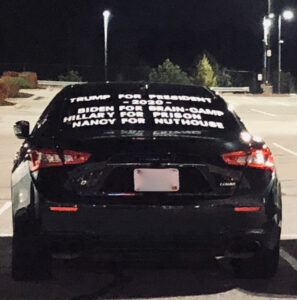
Outside Donald Trump’s St. Louis Campaign Headquarters, election night.
It has been a week. Anything else anybody wants to announce? We could all use a break.
My sons and I were out and about during election week, to bear witness to the historically significant, should it occur. But things in the Midwest have been surprisingly quiet, a good problem for a writer to have when civilization is on the line.
Given the country’s division, it seems odd there have—thankfully—not been more shows of dissatisfaction or posturing, on a national level, this week. It is a paranoid time, so I get suspicious. Where did all the passions go? How might they explode if repressed?
For four years I have tried to defeat social media’s algorithms so I could see a cross-section of everyday Americans’ chatter. Many times my Facebook feed has been a mess as a result, a cacophony of voices yelling past each other and threatening violence. Because none of those particular threats came to be, they have often reminded me of that ongoing threat by Moe, from the Three Stooges: “Why, I oughta!” (Moe, of course, a fascist of sorts, often did lash out with or without warning.)
The Oughtas, as I think of them, were not the radicals or even activists of either political side. They were middle-class, most of them white, whose main interests in life were their jobs and families, and in normal times, their diversions, such as sports.
On the left, they were often writers and academics, who swore that if the administration did just one more thing, they would really start the revolution, take to the streets, surround the White House, drag its occupant out, etc. This rhetoric began immediately after inauguration, and especially after the 2017 Women’s March, the largest single-day protest in US history. That “one more thing” happened almost daily, but none of them began the revolution.
On the right, they were often tradesmen and vets who loved to post memes about how everyone (liberals) better leave old men (them, supposedly) in peace, or else they would turn into the wolves they were and devour them. Because this group has been so enamored with machismo and guns, the possibility they would act on their violent fantasies seemed greater, but they also were surprisingly restrained.
One possibility of large-scale violence on our streets, the kind where hundreds or more could be hurt and killed, seemed to me to hinge on whether these (usually) relatively-centrist groups worked themselves up in such opposition to each other that they created a physical showdown. So far, this has not happened with Why I Oughtas, even as they became more impassioned watching protests and counter-protests this year, and even as one side has now been politically defeated. (The right-wing militias, especially when met by protest groups such as the NFAC, seemed like another real opportunity for sudden armed conflict, and still worry me badly, even for the years to come.)
In fact, now that the presidency has been decided, accepted, but not yet conceded, there has been a turn in the mood of many of those I read on social media.
One vet will serve as example. For years I worried that I should report some of his postings to authorities, but they were never particular. Yesterday, he posted a meme that said, in all caps: “Close your eyes. Count to ten. Take a deep breath. Remind yourself that you wouldn’t look good in prison stripes and just smile at the dumbasses and walk away.”
Read more by John Griswold here.
